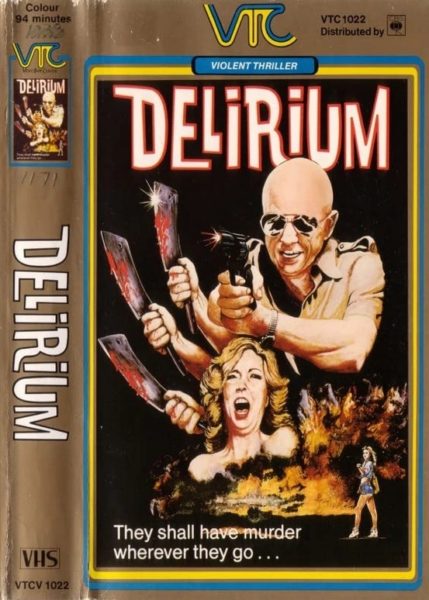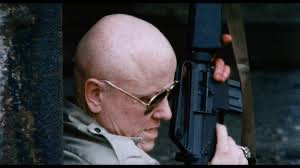I love genre cinema. I will always have a soft spot for horror, action, sci-fi, and all the subgenres that exist inside those larger categories. What I have never felt any real connection to are those films that exist in the realm of pure sleaze. You know the ones: the films from the ’70s and ’80s, filled with ugly violence and sex that is the opposite of titillating, usually shot on cheap film stock with semi-amateur casts. But knowing these films have a large following and several companies devoted to restoring them makes me wonder what I am missing. With that in mind, I am going to do a deep dive into the world of sleazy exploitation. This is My Exploitation Education. This month’s entry is DELIRIUM.

I was going to skip over writing about DELIRIUM (not to be confused with approximately a dozen other genre flicks with that title) because it recently received a Blu-ray release from Severin Films. Any semi-forgotten movie getting a notoriety bump from one of the top physical media merchants of vintage sleaze and exploitation doesn’t really need my meager voice talking about it. But two things piqued my interest and made me reconsider. The first is that, for some reason, this relatively tame flick made the infamous “video nasties” list. The second is that I could not recall ever seeing a regional exploitation film from St. Louis and I wanted to see what memories were shaken loose by a movie shot when I was a child, just three hours from where I grew up. I am glad I ignored my initial instinct to skip the film but can only recommend it as essential viewing for the most committed of exploitation completists.
DELIRIUM is a crudely stitched together Frankenstein’s Monster of a movie. Part slasher flick, police procedural, conspiracy thriller, and surprisingly (accidentally?) progressive critique of vigilante justice, the movie begins with two men dumping a body in the Mississippi River under the cover of darkness and cheap movie lighting. The action then abruptly shifts to Susan Norcross (Debi Chaney) as she finds the body of her roommate impaled on a spear shoved through a door and her back. As two milquetoast St. Louis homicide detectives (Turk Cekovsky, Terry TenBroek) investigate the murder, the film then jumps tones yet again to follow the killer, a sweaty mess named Charlie (Nick Panouzis). Haunted by the memory of his experiences in Vietnam, Charlie runs through the countryside, murdering every woman he comes across.

From this jagged, yet roughly linear beginning, I assumed that the film was going to work as a standard psychotic killer versus police detective flick, but then DELIRIUM gets ambitious, leading to its best moments while highlighting how boring the police procedural plot is.
Susan’s boss (Bob Winters) is a member of a secret society of local business leaders who mete out vigilante justice to criminals found not guilty through the judicial system. The council employs former military officer Stern (Barron Winchester) to run the operation of kidnapping the supposed criminals, forcing confessions out of them, and executing them in ways to make them look like suicides (hence the shady men dumping the body off the bridge to open the movie). But it is clear from the start that the council does not have full control of the unhinged Stern and that he in turn has nothing but disdain for the group of white collar vigilantes who do not want to personally get their hands dirty.
The story of the slasher killer and the cops chasing him would be enough to sustain a tight little horror thriller in the vein of 10 TO MIDNIGHT. The other plot thread of the vigilante council unable to control their muscle would also be enough to chew over in a thoughtful crime drama about the immorality of punishment outside of the system of checks and balances provided by the legal system. But DELIRIUM wants to have both plot threads running concurrently for a full hour before finally bringing them together. The ambition is admirable, but such a feat is beyond the resources of an ultra low-budget regional exploitation movie.
Interviews with director Peter Maris don’t make it clear if he was brought on to the film by the producers to fashion a complete story out of the footage that a previous director had already filmed or if he scrapped everything that came before him and shot a new movie from scratch. The hastily pieced together feel of the Charlie storyline as he wanders through scenes without any dialogue and practically trips into situations where he drowns one woman and impales another with a pitchfork definitely lends credence to the theory that Maris simply added those scenes and reworked the edit of already shot footage. No matter what the true story of the production is, the fact remains that the collision of plots never come close to gelling together in a cohesive tone or story.
https://www.youtube.com/watch?v=CiW2lnp6z44
Still, just because the movie does not live up to its own ambitions that does not mean that it lacks entertainment value. Granted, most of this entertainment is of the unintentional variety, but I’ve always maintained that I don’t care how I find my enjoyment when it comes to exploitation fare; I only care that I have fun.
Chief among the attractions in DELIRIUM is Winchester’s performance. Not only does the actor actually have a better name than his character (seriously, this movie would have improved by ten percent if the character had been named Barron Winchester instead of the generic Stern), but also his look and style of acting can best be described as bargain basement Rod Steiger. Unlike Steiger, Winchester does not quite fill up the frame. Winchester’s shaved head, omnipresent aviator shades, and vocal style of practically spitting out tough guy dialogue are all good choices for a psychotic exploitation movie villain, but the actor’s diminutive stature gives a wonderfully farcical nature to his scenes as he bosses around henchmen a foot taller than him.
The same accidental comedy buoys the Charlie segments of the movie. His flashbacks to Vietnam are a treasure trove of laughs as the wide-open Missouri countryside unconvincingly doubles for a war-torn Asian jungle. Charlie’s present-day antics are also so haphazardly scripted and plotted, the sloppiness manages to undercut what should have been the ugly story of a crazed man killing random women because PTSD has left him unable to get an erection (Maris apparently subscribes to the theory that subtext is for cowards). It is hard to get offended by a potentially misogynistic subplot when the filmmakers don’t bother to put any thought or care into how or why they get women out of their clothes around conveniently placed sharp implements. But it is good for a cheap laugh.
Given that most of the fun to be had with DELIRIUM is found in its most ridiculous performance and half-baked embrace of slasher violence and nudity, it is a shame that so much of the movie focuses on the police investigation.
While I am far from an expert on the inner workings of murder investigations, there is a feel of authenticity to the way the detectives conduct their business in mundane fashion. The cops make fruitless phone calls, wait for lab results, and interview potential witnesses who have no information to provide. The production had the full cooperation of the St Louis Police Department (the chief of police and medical examiner play themselves), so these scenes were shot in an actual police station and the county morgue with cops acting as the extras.
But authenticity does not equal drama. Given that Maris never hides the truth from the audience, spending half of the movie with dull looking actors methodically trying to uncover that truth is largely a boring waste of time that could be given over to Winchester’s scenery chewing take on Napoleon as a hilariously crazed vigilante. It is telling that the only time the police storyline develops any real interest is in the ridiculous gun fight that Stern initiates with the cops as the movie finally goes for an over-the-top, squib happy ending.

I hate to critique any exploitation film for having half a brain, but DELIRIUM is at its best when it indulges in its sillier moments. Criticizing vigilante justice and offering a realistically dull look at the drudgery of police work are both admirable qualities, but they don’t make for a dynamic viewing experience. As a record of a specific time and place that I remember from long ago, I’m glad the movie is readily available for viewing again. But as a “lost” video nasty, it’s a reminder of how mild a lot of those flicks actually were.
Tags: Barron Winchester, Bob Winters, Debi Chaney, Delirium, Exploitation Films, My Exploitation Education, Nick Panouzis, Peter Maris, Severin Films, Slasher Movies, St. Louis, Terry TenBroek, Turk Cekovsky, Video Nasties



No Comments